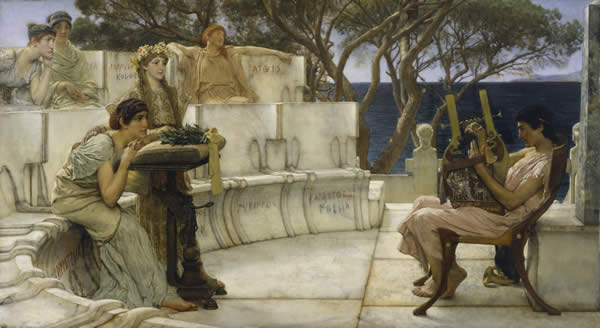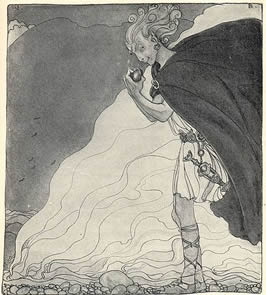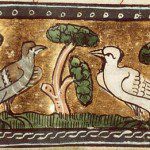“You should worship Loki. He’s the only one of our Gods that successfully changed their sex.”

Those words came from a conversation that I had at the Wellspring Festival in 2015. While I do honor the Wolf-Father in my own way (yes, boo hiss boo, I know) it has nothing to do with me being transgender. As a matter of fact, the assignation of trans status to Loki has always gotten under my skin, as it does when people label Tiresias as transgender.
A transgender person identifies with a gender different than the one assigned to them at birth. There is no indication in the lore that we have regarding Loki that he identified as a woman or even that he was assigned male at birth – these are things that we do not know. We know that he is a shapeshifter. We know that he developed a uterus when he became the mother of Sleipnir and the nameless children mentioned by Odhinn in Lokasenna. We know that he is capable of changing his body and how he manifests – a not uncommon trait among deities, especially the tricksy sort. With Tiresias, again, we don’t know how he identified – a key part of transgender identity. We know again that his body was changed at that point, and that he enjoyed his time living “as a woman”. We don’t know how he thought of himself at any point in his career. Language for gender identity was not the same back then (despite all of the lovely Greek and Latin roots we love to use for it nowadays.)

by Lawrence Alma-Tadema Walters Art Museum: Home page Info about artwork
Licensed under Public Domain via Commons.
Or we can look at a more historical (but still highly relevant to modern Pagans) example – Sappho. Sappho’s poetry and invocations express love for those of multiple genders, and yet her homeland has become the word for women who only prefer other women, and her name has been similarly adapted. So while it’s understandable that any gynophilic Pagan women could identify with Sappho, strictly describing her as a “lesbian” in modern terms may not be entirely accurate (despite the irony of the permanent entanglement of her identity with that term).
In these cases and many others like them, a mythological figure (or an historical figure that has become mythologized or is tied to our mythologies) is attached to a modern understanding of a part of the human condition. We do this all the time with stories and legends – we all seek figures that we can identify with. When a population is particularly under-represented people strive to find figures that fit some portion of their narrative to latch on to.
I know the urge; I completely understand it. I really do wish that there was a trans woman in Norse mythology or the sagas who I could offer to and honor! Someone who had dealt with the same pain and sorrow, someone who had striven to cope with the same difficulties that I do every day and has fought similar battles. Someone that I could point to as part of my sworn duty to other transgender Pagans, when they are looking for the same.
So while I would love to pluck figures from mythology and claim them for my people, I don’t. In fact, I view it as harmful for a few very important reasons.
External Misunderstandings
In a lot of cases these assignations are not made by people who fit into these categories themselves. Especially when it comes to gender identity and sexuality, people who do not have these same experiences rarely come to them from a point of understanding. That’s not their fault; I can’t expect cisgender (folks who aren’t transgender) people to understand what trans folk go through.
To someone who has never questioned whether or not they are straight and negotiated the sometimes labyrinthine definitions that we have developed for various sexualities nowadays, it’s easy to label someone as “gay” when they’re observed interacting intimately or romantically with a member of the same (perceived) sex. However, there is a range of terms used to describe the experiences of people with different varieties of sexual attraction that (while frequently mocked by those who do not experience them) are actually valuable in helping us to realize that there are others that feel the same way and go through the same experiences.
What does someone who is not trans witness when a trans person goes through the process we call transition? To their eyes they see someone of one gender “becoming” another. For a lot of transgender people, though, that’s not what they experience at all – many of us have always seen ourselves as a particular gender, and are in the process of making our bodies and social characteristics align with our inner identity. Only someone who has never gone through this themselves would tell us that those are one and the same thing.
What do straight people see when someone is exploring and attempting to understand and come to terms with their sexuality? They often see us as “experimenting”, “questioning”, or worse, “confused”. Confused because we don’t conform to what we’ve been raised to believe is the standard-issue sexuality, questioning because we’re questioning the assumption that all people are naturally heterosexual, experimenting with different bodies to find what resonates with us because the ones that we’re told that we’re supposed to be attracted to don’t do it for us. Again, if you haven’t been through it, it’s something that you can’t personally understand.
That doesn’t mean that you shouldn’t try. I know that I don’t know what it’s like to be a person of color in the United States, but I try to educate myself on it. I do that by listening to the voices of PoC who are trying to explain the injustices and pain that they experience. I do it by hearing them talk about the systemic racism that they face that I can’t see because I’m not experiencing it myself. I know that I will never encounter the same things that they do, but I do know that I can listen to them when they speak, try not to talk over them, and try to empathize with them.
It’s very important to acknowledge that we won’t understand all human experiences. Telling someone that their experience or interpretation thereof is incorrect when you have not yourself lived through it can be dangerous and damaging to them. It is essentially telling them that they do not know themselves and understand their own lives, and that your own understanding of their experiences is superior because it does not match theirs.
Internalized Phobia
One of the worst things that can come out of this is an internalized misunderstanding. Let me give you a highly personal example.
When I was a teenager/twentysomething in the nineties, there was very little public education on sexuality and gender identity. A lot of folks conflated the two things (in fact, they still do). So that left me confused – I was told that someone who the world viewed as a man who knew themselves to be a woman was “gay”. I tried for years to live as a gay man, with depressing and sometimes amusing results. Men who liked men who drew close to me romantically would usually back away quickly; whether they were conscious of it or not they realized that I was not what I was pretending to be. The only long-term relationship that I had was with a man who identified as gay socially but admitted he preferred people over their parts.
So I spent years of my life in a spiral of confusion because public understanding of what I was going through was lacking, and my own research ended up muddying the waters because it did not match what everyone else seemed to think of it. It brought about pain and self-harm as I tried to force myself into a role and identity that wasn’t mine. I wasn’t alone in that, either; many transgender people have experienced the same.

What does this have to do with identification with mythological figures? We internalize what we learn through our culture. Pagan culture is no exception – we are developing our own micro-cultures in our paths and traditions, as any Heathen or Druid will tell you. Let’s take the example of Loki again. For someone like myself who had no other association with him, being told that he should be a patron or that I should be Fulltrui (trusted friend or representative) to him because of the misunderstood assignation regarding his gender identity confuses multiple issues. Others that I’ve encountered have been rejected by Heathens because they incorrectly associate him with transgender people, and consider him to be evil.
I’m privileged in that I’m well-educated on gender issues and Norse mythology and have a solid stance and opinion on the matter. Someone without the benefit of my education could be casually pushed away from Heathenry and would likely internalize that negativity. I’ve seen it – trans people and gay or bi folks who refuse to associate with Heathenry or Celtic Recon or other paths because of the hostility that they’ve encountered, often based on misunderstandings of lore, history, and identity.
This stuff matters. If it doesn’t affect you it might not matter to you directly (or at least you might think that it doesn’t) but it affects people. As our paths develop more solid worldviews and we come to see life through Pagan lenses those worldviews are going to inform membership and community. I’d hate to see us go commit the same sins that many mainstream religions have by constructing cultures that are inimical to our understanding of our identities and struggles, with dogma being passed down by people who have never had these experiences themselves. Those who might benefit from our paths might be forced to turn from them. We also run the risk of eschewing the benefits of having people who can provide vital diversity and important perspectives to our communities by basing our understandings of them off of our own opinions rather than what they know to be true about themselves.
Personal Subjective Experiences
I use PSE (personal subjective experiences) for a broader category of experiences that include but are not limited to UPG. I like to say that there is no gay-o-meter that you can stick into someone’s head and tell their sexuality. There is no gender spectrometer that can tell you who a person really is on the inside. While behavior can provide indications, it’s not a certainty. A person could be married to a man for twenty years, have four kids, and still be a lesbian (I’ve seen it); anyone can learn to play a role. Anyone can pretend for their own safety, or because they’ve been told that a certain way to be is the only right or healthy way by people who have not shared their experiences.
Our spirituality is informed by a combination of personal subjective experiences and lore (which is the PSE/UPG of our Ancestors). While we may gnash our teeth and fight about UPG and its place and application to a certain extent everyone’s practice and belief is subject to it. As a group of faiths that embrace (or at least don’t outright shun) our personal subjective spiritual experiences, I believe that it’s important to keep our eyes open to other personal subjective experiences that fall outside of just our spirituality. We many-souled humans have many components to our identities, and if we follow paths that claim the importance of community and family we need to be cognizant of our own limitations in understanding experiences outside of our own.
What can we do?

Let me say that (going back to the same example) there are transgender people who identify with Loki. We often do work to change our bodies to match our identities, and he is a shapeshifter, after all. He’s not alone, either – there are a lot of deities that, for one reason or another, resonate with trans people. The excellent book Hermaphrodeities contains some examples and was an inspiration to me that helped me to think about and consider the possibilities of gender regarding the Powers.
For those of us who follow paths that venerate the Ancestors, we may have additional options. Thorberg from the Saga of Hrolf Gautreksson identified as a man despite the disagreements of others around him (there’s an essay with some information on him linked here) and the dismissive attitudes of many scholars that have reviewed the material. I’ve always thought that the Roman emperor Elagabalus may have been a trans woman – Elagabalus offered a princely sum to any surgeon who could “fix” their genitals and shamed the stodgy Romans with their effeminate ways. There are countless Ancestors in Pagan histories that display non-hetero sexualities as well, from Sappho to Alexander the Great.
In addition, when reaching out to Ancestors we need not merely go to Pagans for aid and guidance. Modern and historical individuals whose identities resonate with our own are suitable subjects for veneration and supplication. As an example, in my old household we would perform a rite of offering and thanks to Harvey Milk on Harvey Milk day.
You need not know the names or identities of the Ancestors to call on them if you know how. I’ve done work with the Transgender Dead before, reaching out and back through time to those of the past who aligned with my identity and struggles, and have made contact with spirits willing to assist and guide us now. Queer and trans Ancestors exist, and they want veneration as much as any others (thus my habit of adding a third category of “and everyone else” or “those who were both or neither” when folks offer to the Mothers and Fathers of our lines). In many cases they may be bitter due to their treatment in life, but I’ve found them to be welcoming of the love and attention and acknowledgement. At the LGBT Ancestor rite that I performed at Wellspring of 2015, we received omens in the form of a candle and a quill – “Keep the candles lit for us.” and “Keep telling our stories.”, they seemed to say.
If you’re not of a particular identity, don’t tell someone who they should or shouldn’t venerate based off of that. Trying to pigeonhole us into roles that we don’t fit into only ends up hurting us and pushing us away. Telling us that we should be “skilled shapeshifters” or more capable of walking between worlds because we’re transgender or non-hetero isn’t celebrating us – it’s assigning us particular roles that we haven’t asked for and may not actually be skilled at performing. Traditional or not, not all of us fit into those categories – if we do, let us discover these things on our own.
What you can do is provide us with information, listen to us when we tell you what’s going on with us, and help guide us in coming to our own decisions. Attempt to respect where we’re coming from – trans and queer people walk a hard road, and it doesn’t “get better” for many of us, despite popular campaigns to the contrary. What will make it better is allies willing to listen and work with us based on our own understandings of our experiences. That will help us to feel at home and negotiate our own spiritual paths, and you might just learn something from our unique experiences and viewpoints in the process.

Patheos Pagan on Facebook.

the Agora on Facebook
The Lady’s Quill is published on the second and fourth Thursday of every month. You can subscribe by RSS and e-mail.
Please use the links to the right to keep on top of activities here on the Agora as well as across the entire Patheos Pagan channel.

















